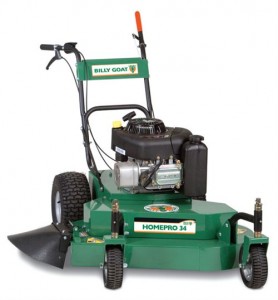 Personal protective equipment (PPE) and best practices aren’t fun subjects, but it’s a necessary part of using outdoor equipment. No one wants to think about being injured on the job, and some workers will avoid equipment and safety precautions because they think it just slows them down. However, consistently using preventative safety measures can prevent long term health problems and reduce your liability.
Personal protective equipment (PPE) and best practices aren’t fun subjects, but it’s a necessary part of using outdoor equipment. No one wants to think about being injured on the job, and some workers will avoid equipment and safety precautions because they think it just slows them down. However, consistently using preventative safety measures can prevent long term health problems and reduce your liability.
Inspecting the Work Area
Striking obstacles can be dangerous and costly. Before you use a vacuum, aerator, sod cutter or overseeder, take some time to inspect the lawn. Remove rocks, chains, toys and other obstacles from the areas. Mark fixed obstacles, like sprinklers so you can keep your equipment away from them.
If you think your vacuum has something hard rattling around inside the impeller case, shut it down immediately. The object will either damage the machine or turn into a projectile once it leaves the chamber.
Hearing Protection
Even as outdoor equipment and small engine manufacturers work to reduce the noise of their machines, they’re still loud enough to cause hearing damage. Exposure to sounds over 85 dB for 8 hours is considered hazardous, with Billy Goat’s loudest equipment reaching 97 dB at the operator’s position. The decibel scale is logarithmic, so loudness doubles every 10 dB. At 97 dB, a machine can cause serious permanent hearing damage in just 8 hours of exposure.
The best choice for hearing protection is the type you can live with. Some people prefer muffs, while others like earplugs. Either will work as long as you use them consistently.
Eye Protection
On average, over 2,000 people injure their eyes at work each day in the U.S, and one in ten of these injuries results in the loss of at least one work day. Using the right eye protection could eliminate or reduce the severity of at least 90% of these injuries. Eye protection is part of OSHA-required personal protective equipment, but it should be part of any operator’s equipment, whether they’re a professional or homeowner.
Make sure your glasses or goggles meet the latest ANSI Z87.1 standard, currently 2015. This will be stamped somewhere near the lenses. If you see an earlier year, it’s time to get a replacement.
Vibration
Vibration damage isn’t as well researched as hearing and eye damage. However, we’re starting to understand how it affects the body, and what we need to do to reduce exposure.
Hand-arm vibration (HAV) exposure leads to carpal tunnel syndrome and other hand and finger-related injuries. Vibration limits blood flow, starving cells of nutrients and oxygen over long periods. This first shows up as hand-arm vibration syndrome (HAVS.) Nerve damage limits feeling in the hands and fingertips, and fingertips turn white from lack of blood circulation.
Billy Goat includes vibration test data in their owner’s manuals based on the ANSI S2.70-2006 measuring standard. We don’t have any vibration regulations in this country yet, but the EU requires protection for workers exposed to0.5 g of vibration force during their work shift. Wearing anti-vibration gloves reduces the transfer of vibration, preventing nerve damage and reducing operator fatigue.
Dust
Dust is more of an annoyance than a danger unless you work on construction. Cement leaves behind silica dust, which can cause permanent lung damage if inhaled. The QV Quietvac can vacuum this dust, but only if it’s dry and if the dust sock is installed.
Maintenance Safety
When working on your equipment, don’t just shut off the engine. Unplug the spark plug wires. There’s always the possibility that turning something connected to the crankshaft will turn over the engine, starting it.
Never put your hand inside a vacuum or debris loader. A jammed impeller can snap forward when it is freed, damaging or slicing off fingers. Instead, use a piece of wood to push away debris. Still stuck? Shut off the engine and disconnect the spark plugs. Unbolt the impeller housing and use tools to remove the blockage.
Debris loader chutes are heavy, and their placement almost always requires reaching overhead to get them in position. If you’re fitting a chute or extension to your loader, have someone on hand to help you move it and keep it still while bolting it down.
Maintained Equipment is Safe Equipment
Do you need to do some work on your Billy Goat Equipment? You can get everything you need from www.billygoatparts.com. We’re not just an online store: we’re an authorized dealer for Billy Goat and their manufacturing partners including Honda Engines, Tuff Torq, Briggs & Stratton and AR Pumps. Our site has built-in diagrams for machines and engines so you can see what you’re ordering. We also have sections for popular items, making it easy to order tines, air filters, and other common replacement parts. We ship across the United States or Canada.
